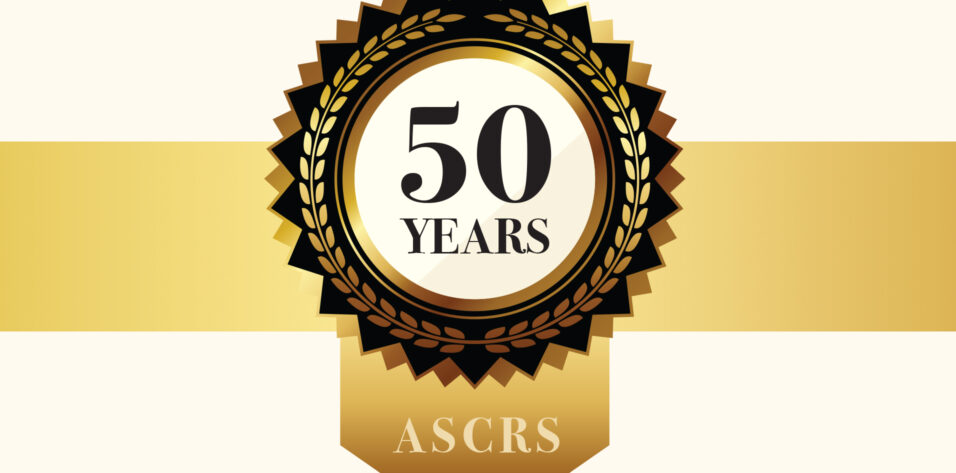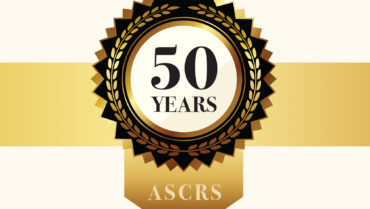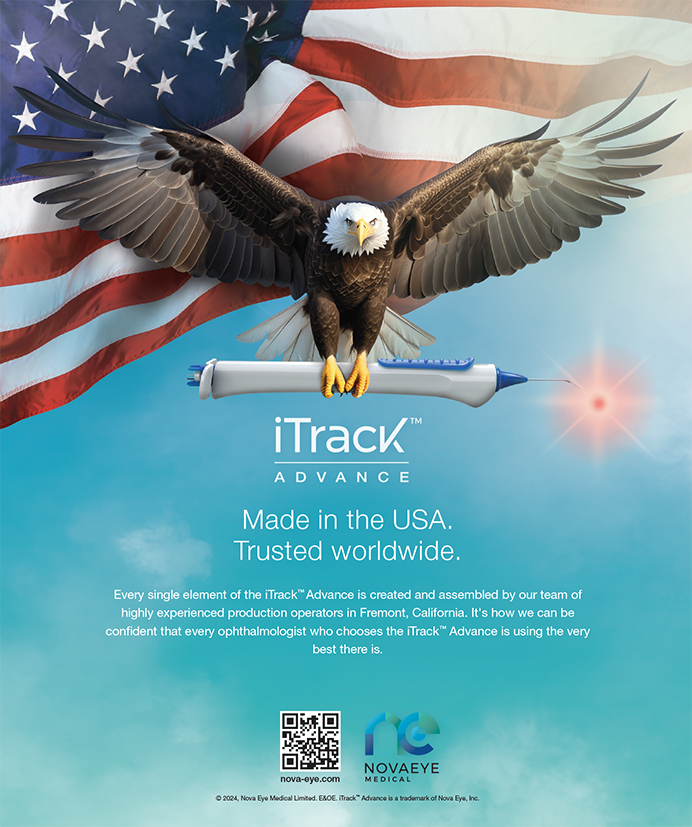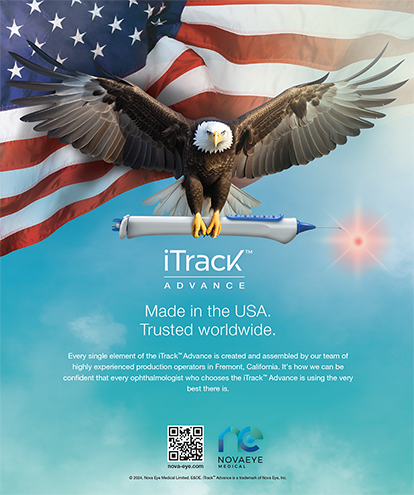CRST: What do you believe are the ASCRS’s greatest accomplishments over its 50-year history?
Steve Speares: Candidly, I would say the biggest accomplishments are that the organization still exists and is still relevant. There have been numerous times throughout the history of ASCRS when the pressing challenges facing anterior segment surgeons were eased, and it was at those times ASCRS found a purpose that aligned with the broad needs of anterior segment surgeons. When you look back at the financial, technological, cultural, and societal changes, ASCRS has remained relevant and important. For the size organization we are and the size of our operating budget, we are probably one of the most respected subspecialty societies among stakeholders in Washington, DC.
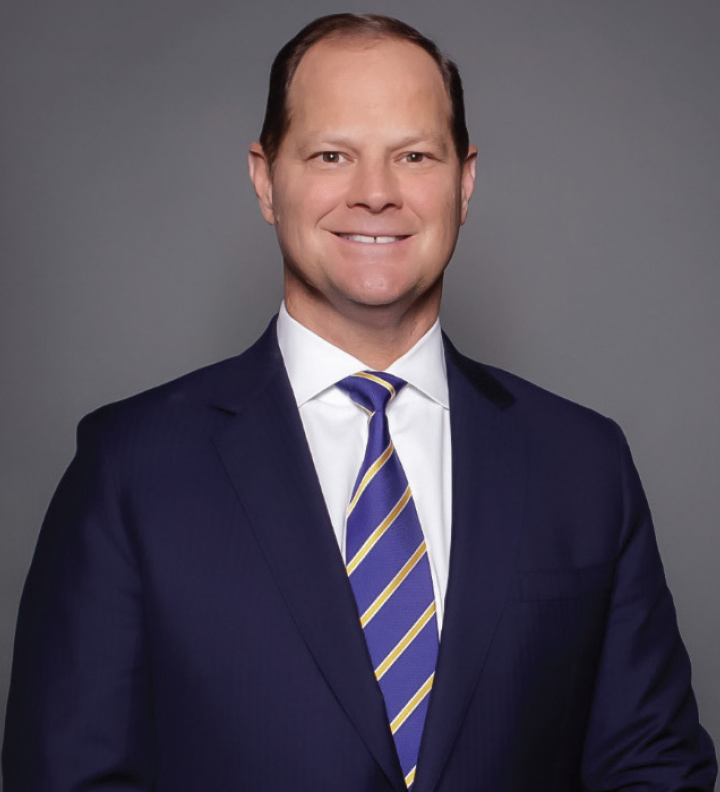
CRST: What are the primary needs and challenges facing anterior segment surgeons in the coming decades? How is the ASCRS working to assist surgeons in these areas?
Mr. Speares: Wow, that’s a tough question to answer briefly. There are so many enormous challenges facing anterior segment surgeons here in the United States and across the globe. If you were to crystallize and distill the single largest challenge, I would say that it’s financial. We’ve continued to see the value of sight restoration commoditized in the eyes of payors—no pun intended. That’s not just here in the United States but across the world. If IOLs and phacoemulsification were invented today, a procedure would probably warrant a $50,000 reimbursement based on the health economics of what patients receive. In some ways, our success has been our biggest adversary. Surgeons will continue to have to find greater efficiencies without compromising patient care.
At ASCRS, we will continue to provide the latest cutting-edge education on evolving technologies and procedures as well as the essentials of good clinical practice. But, we will also begin to pivot and focus more on the business of anterior segment surgery. It is going to be essential that our organization step forward and be a greater resource on the business of running a successful ophthalmic practice.
CRST: The educational needs of anterior segment surgeons are evolving. How is the ASCRS changing the content it provides and how it delivers education in response?
Mr. Speares: We’ve seen some dramatic changes in the interests and needs of our members. When we talk to our members through various types of research, we find that they are increasingly looking for engagement, fun, and education—sometimes in that order. Our live events are going to become more intimate and designed to facilitate greater interaction. We have just launched our ASCRS Live dinner series, which will visit nine cities across the United States between March and December 2024, and each event is by design an intimate evening of anterior segment surgeons discussing pearls on refractive cataract surgery. Even in our larger programming, you will see more segmented and targeted educational efforts. It is a unique time for our society as we have four distinct generations of members who, generally speaking, have distinct interests and needs.
CRST: AI is generating excitement and innovation but also uncertainty and fear inside and outside of medicine. In the field of ophthalmology, AI has a growing role in the detection and monitoring of posterior segment disease. What role do you envision for AI in the anterior segment, and how is the ASCRS seeking to encourage innovation in this area while addressing the concerns that AI raises?
Mr. Speares: I think we are all trying to just keep up with where AI and machine learning are today. Trying to anticipate where this disruptive technology is going to be in a short amount of time is almost overwhelming. This is a good example of how our close relationship with industry partners benefits all our members. We don’t know exactly what industry is working on at the moment, but by working closely with them, it allows us to better prepare for how technology changes might mandate changes in clinical practice. From my perspective, I think there must be a role for AI to help us better understand glaucoma diagnosis, evaluation, and progression. If this capability can allow remote monitoring, that would obviously be a game changer.
CRST: In 2022, Aetna mandated and subsequently rolled back its demand for prior authorization for cataract surgery. More recently, Medicare administrative contractors (MACs) signaled that claims for certain technologies and treatments for glaucoma may not be paid. What are the big legislative issues for anterior segment surgeons in the next 5 to 10 years, and how is the ASCRS advocating on their behalf?
Mr. Speares: We did play an important role in pushing back against these preauthorization efforts. There is no doubt our members will continue to be faced with policies that have nothing to do with patient care but have everything to do with juicing these large carriers’ bottom line. It is pure, naked greed.
Equally troubling was the MACs’ sudden realization that 510(k) devices rarely have well-controlled studies as part of their approval process. If payors begin mandating a device version of an Investigational New Drug Application, the impact on innovation will be monumental. We don’t know that is going to happen, but certainly the MACs’ describing FDA-approved products as “experimental” was a shock to all of us.
Our legislative focus will be to continue our strong relationships on Capitol Hill and work collaboratively with our partners at the AAO. With the growth of the federal budget deficit, we will undoubtedly see continued pressure on reimbursement for professional fees.
CRST: What are the ASCRS’s main philanthropic goals in the next 2 decades?
Mr. Speares: At this point, our strategic plan for the ASCRS Foundation has a 5-year horizon, which might sound short but is a direct correlation to the “reset” we went through in 2023. We brought Abigail Markward, MBA, in as our new executive director of the ASCRS Foundation, and she is bringing a fresh assessment of our capabilities and fundraising. We are in the process of streamlining aspects of our Operation Sight program while continuing the good work of supporting global ophthalmology. Dr. Susan MacDonald assumed the role of chair of our foundation from Dr. David Chang in 2023, and there are few individuals who have a better understanding of how various organizations can work together toward the common purpose of curing preventable blindness.

